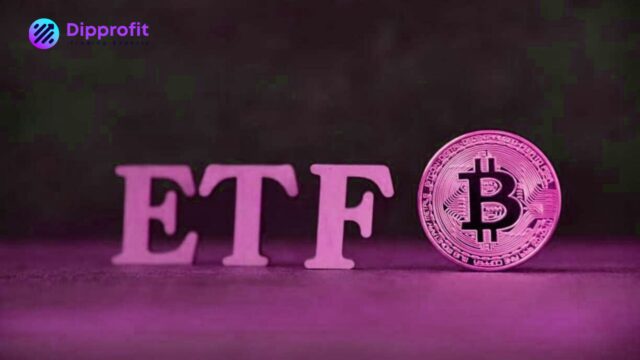Information reaching us has shown that the 3rd largest bank in the US has invested in Bitcoin ETFs.
But wait a second, how does this really affect the crypto market? We’ll give you all the answers you need in a very brief read. Don’t skip.
Wells Fargo’s Bitcoin ETF Holdings

Fargo’s recent announcement about its investments in various Bitcoin ETFs, like the Grayscale Bitcoin Trust (GBTC) and ProShares Bitcoin Strategy futures ETF, is a very important step for the bank and the cryptocurrency market. This indicates Fargo’s interest in cryptocurrencies.
The Grayscale Bitcoin Trust (GBTC) allows investors to gain access to hold Bitcoin without actually owning it. Instead, GBTC holds Bitcoin on behalf of all its investors, and its shares are traded on the OTC markets. This investment allows Fargo to profit from Bitcoin’s price movements without
On the other hand, the ProShares Bitcoin Strategy ETF tracks the performance of Bitcoin futures contracts traded on the CME. This ETF provides investors with another way to invest in Bitcoin, but this time through futures contracts.
Fargo’s decision to invest in these ETFs is very important for several reasons. First, it shows that the bank recognizes the growing importance of cryptocurrencies.
Secondly it could have a positive impact on the cryptocurrency market by increasing institutional participation and liquidity.
In essence, Fargo’s investments in Bitcoin ETFs is a welcome development for the bank and the crypto market.
See Also: Bitcoin ETFs Hit 10B Dollars 🗞️
Rapid Growth of Bitcoin ETFs

The rapid rise and acceptance of Bitcoin Exchange-Traded Funds (ETFs) is evident in BlackRock’s IBIT and Fidelity’s FBTC ETF, which have amassed $10 billion in assets quickly. This growth is fueled by several factors fuelling the expansion of ETFs.
One major driver is the growing interest among institutions in Bitcoin as an investment. Hedge funds, family offices, and asset managers view Bitcoin as a hedge against inflation, propelling them to invest in Bitcoin ETFs.
The participation of major financial institutions like BlackRock and Fidelity lends credibility to Bitcoin as an asset class, attracting more institutional investors.
Another important driver are the new regulations on cryptocurrencies. Regulations approved, particularly from the U.S. Securities and Exchange Commission (SEC), provide a compliant channel for institutional investors to invest in Bitcoin.
Additionally, there is a growing demand for Bitcoin from retail investors. Retail investors are enticed by the potential profits offered by Bitcoin and find it convenient to invest through ETFs.
This accessibility and simplicity of ETFs Bitcoin an attractive option for retail and institutional investors alike.
See Also: Spot Bitcoin ETFs Introduced In Hong Kong 🗞️
Conclusion
In summary, Wells Fargo’s investment in Bitcoin ETFs is an important move for both the bank and the crypto market, indicating a growing interest in cryptocurrencies.
Investing in ETFs like the Grayscale Bitcoin Trust (GBTC) and ProShares Bitcoin Strategy futures ETF, allows Wells Fargo to position itself to benefit from Bitcoin’s price movements without directly owning the Bitcoins.
This decision shows a wider trend of institutional acceptance of cryptocurrencies, potentially leading to increased market stability and liquidity.
Similarly, the rapid growth of Bitcoin ETFs, shown by BlackRock’s IBIT and Fidelity’s FBTC ETF, reaching $10 billion in assets, indicates the increasing appeal of Bitcoin as an investment option for both institutional and retail investors.
You can also join our Telegram community where you can learn all you want to know about the cryptocurrency space, defi, web3, and airdrop opportunities and also have access to live AMA sessions from time to time, then click the button below to join Dipprofit Telegram Community For Free Now


